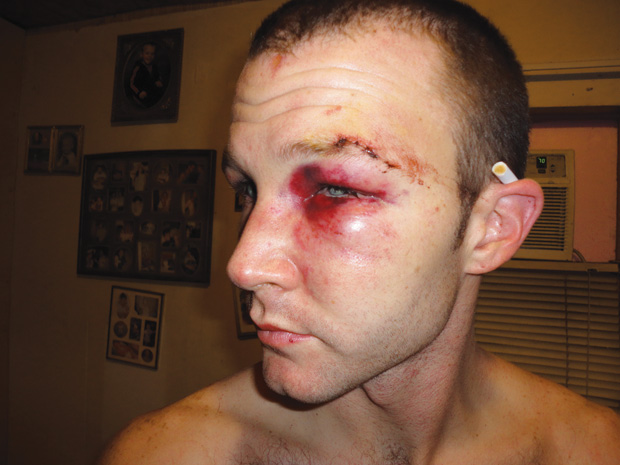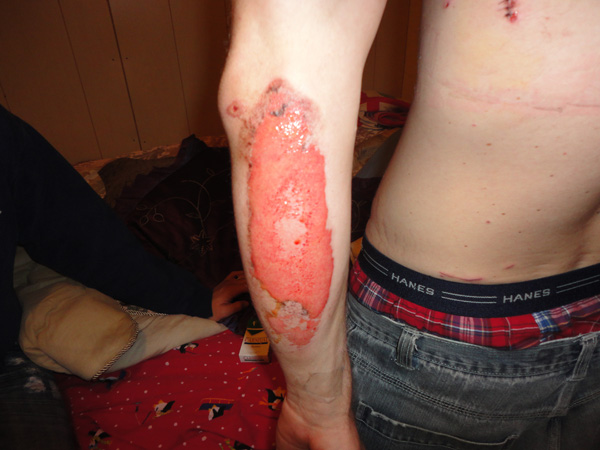Victim Burke Burnett says he is relieved the men are behind bars and that he believes the attack was an anti-gay hate crime

BRUISED AND BLOODIED | Burke Burnett said he was sucker-punched in the left eye at the beginning of the attack.
JOHN WRIGHT | Senior Political Writer
wright@dallasvoice.com
RENO, Lamar County — The victim of a brutal assault last weekend in East Texas said he’s relieved three suspects have been arrested in connection with the attack, which he believes was an anti-gay hate crime.
But it remained unclear this week whether the case is being investigated as an anti-gay hate crime by police and whether it will be prosecuted as one by the Lamar County District Attorney’s Office.
Burke Burnett, 26, said he was jumped by several men at a Halloween party early Sunday in Reno — a tiny town just east of Paris and about 100 miles northeast of Dallas. Burnett’s attackers yelled anti-gay slurs as they stabbed him repeatedly with a broken beer bottle and threw him onto a fire.
He needed more than 30 stitches and suffered second-degree burns.
After graphic photos of Burnett’s injuries were posted online by Dallas Voice and drew national attention to the case, Reno police arrested three suspects Tuesday and Wednesday and charged them with aggravated assault.
“I’m grateful that they’re in custody,” Burnett said Thursday. “I’m in a lot of pain, but I am feeling better. I don’t want to see this ever happen to anybody else again.”
Burnett, who lives in Paris and came out as gay when he was 15, said he’s convinced the attack was fueled by his sexual orientation.
“The things they were screaming while they were doing it leave no question in my mind as to what their motives were,” Burnett said. “If that constitutes a hate crime … I don’t know all the laws behind that. It’s not my job to judge these guys or to say what justice is. I just hope that justice is served because what they did was wrong. It would have been wrong no matter who they did it to.”

SERIOUS BODILY INJURY | Burnett suffered second-degree burns on his arms when he was thrown onto a lit burn barrel.
Reno police said they’ve arrested 31-year-old James “Tray” Mitchell Laster III, 33-year-old Daniel Martin, and 25-year-old Micky Joe Smith. All three are charged with aggravated assault with a deadly weapon and aggravated assault causing serious bodily injury — second-degree felonies punishable by up 20 years in prison. Each is being held on $250,000 bond.
Police have been tightlipped about their investigation and declined to release written arrest reports this week. A representative from the Reno Police Department indicated it will be up to the Lamar County District Attorney’s Office to decide whether the attack was an anti-gay hate crime.
Lamar County District Attorney Gary Young, in turn, said it will be up to a grand jury to make that determination. Under Texas law, a hate crime is not a separate charge but rather an enhancement that could result in the existing charges being bumped up from second-degree felonies to first-degree felonies — punishable by up to 99 years in prison.
“We’re in the process of receiving all the information as a result of the investigation,” Young told Dallas Voice. “We will present all that information to the grand jury, including all the information as to whether it’s a hate crime or not. The grand jury will make a determination whether it [a hate crime] is or isn’t part of the charge. If their actions of committing the aggravated assault are based on race or sexual orientation or whatever it may be, the grand jury can choose to enhance the offense up a level.”
Young declined to further discuss the cases.
Chuck Smith, deputy director of the statewide LGBT advocacy group Equality Texas, said the quick arrests in the case are a positive sign that Burnett’s attack isn’t being swept under the rug. But Smith said there are always concerns about whether police and prosecutors understand how the state’s hate crime law is supposed to work.
“While it’s true that that’s a prosecutor’s decision, it’s also important that the law enforcement investigators document everything that a prosecutor would need to know in order to elect to prosecute it as such,” Smith said. “The police can investigate it as such, and then the district attorney can prosecute it as such. A grand jury is going to receive proposed indictments from the District Attorney’s Office. The prosecutor would ask a grand jury for an indictment under those terms.”
Equality Texas has long advocated for a legislative study on enforcement of the state’s hate crimes act, rarely used by prosecutors in the 10 years since it passed.
“The reporting from jurisdictions in Texas is not comparable to departments of similar sizes in other states, and that’s a function of the state not adequately training and enforcing and using the hate crimes act,” Smith said. “They don’t aggressively report because they think it would reflect badly on their community, where in actuality the converse is true. In communities that aggressively report, it actually makes those communities safer.”
This article appeared in the Dallas Voice print edition November 4, 2011.
















Mr. Burnett, you are very courageous for reporting this heinous crime and for standing up and fighting these thugs. I wish you a speedy and full recovery. You rock!
Burke…I wish you a very speedy recovery. I am truly sorry that you had to experience that. If they do not charge this as a hate crime, I would encourage you to then see charges on the police department and the prosecuters.
Mr Burnett, It’s horrible what you went thru. I wish you a speedy recovery. Also, you need to work with the LGBT and get more attention to your community and get these guys prosecuted. Don’t allow them (law enforcement) to try your case as an assault. It’s more serious than a regular assault. Stay strong and always voice your rights an a human being.
MR. BURNETT,MY PRAYERS GO OUT TO YOU .THIS IS A AWFUL THING THAT I HOPE LAMAR COUNTY PROSECUTES TO THE MAX FOR EACH ONE OF THEM THIS IS MORE THEN A HATE CRIME IN MY BOOK IT IS ATTEMPTED MURDER THEY STAB YOU SEVERAL TIMES AND PUT YOU IN A FIRE THEY DID NOT EXSPECT YOU TO MAKE IT THIS MAKES ME SICK THAT PEOPLE DO THIS TO ANYONE I THINK EVERYONE HAS A RIGHT TO BE WHO YOU WANT TO BE GENDER ,RACE AND SO ON .I JUST HOPE GARY YOUNG STICKS IT TO THEM AN I HOPE THE JURY ARE TRULY IN ORDER I KNOW FROM LIVING IN PARIS FOR A WHILE THAT WITH A SMALL TOWN IT IS HARD TO FIND ALOT THAT WITH SAY GENDER DONT MATTER BUT THEY ALSO GET SCARED TO SPEAK OUT I PRAY THE JURY IS NOT BIAS I WISH YOU THE VERY BEST AN DONT SETTLE FOR LESS YOUR ARE WORTH MORE YOU ARE MORE GOD BLESS THANK YOU KIMBER
I hope those losers get it rrrrrrrrreal good in jail.
PS: Burke…cig’s kill.
Kimber, The hate crime in this case was based on hate toward sexual orientation, not gender.
The scumbags who committed these crimes at complete cowards. Yes, cowards – as they only attack, like wild animals, in groups were there own safety would not be challenged. Now we’ll have to see if the Lamar County DA has the character and integrity to charge them with a hate crime – which clearly it was. IF the DA wimps out it will be yet another sick offense.
Mr. Burnett. I hope you are recovering. Just remember our father will return to them ten fold.Imagine the hell he will put them through !
Here’s to hoping that these scumbags meet a lot of VERY LARGE, MUSCULAR, AND WELL-ENDOWED homosexuals in prison!
FREE THE RENO 3!!!